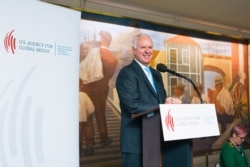A report on security procedures for vetting workers at the U.S. Agency for Global Media, which oversees Voice of America and other U.S.-funded news networks, is exposing divisions between the agency’s current and former leaders.
The USAGM on Tuesday released a 96-page report by the U.S. Office of Personnel Management – marked “not to be released to the public or other personnel who do not have a valid ‘need-to-know’ ” – following new CEO Michael Pack’s call for the review late last month.
The report’s findings highlight chronic deficiencies about the vetting of employees going back almost a decade. Problems ranged from what the report describes as a lax approach to background checks and record-keeping to background investigations that were too aggressive and “beyond the scope of the Federal Investigative Standards.”
The report’s harshest criticism, however, focused on the former.
“The quality of USAGM’s background investigations posed a serious risk to both the agency and the Federal Government as a whole,” the report said. “USAGM employees have not been properly vetted, yet currently have access to government systems, facilities, and, in some cases, sensitive or classified information.”
The report called on USAGM to “immediately initiate new investigations for all individuals investigated by USAGM” since 2012, when the agency’s authority under a vetting agreement with OPM officially expired. The report said this affected 1,527 past background investigations, of which only 314 had been scheduled for reinvestigation as of February.
VOA reached out to both USAGM and OPM for clarity on how many current employees have been properly vetted, and to describe what, if any, damage may have been done to U.S. national security as a result. Neither agency responded for publication.
Former USAGM CEO John Lansing, who led the agency for four years before resigning last September, pushed back against allegations that management had resisted changes intended to improve security.
“The much bigger and more important issue is the attempt by Michael Pack to weaken and delegitimize VOA and other USAGM properties and their Congressionally mandated mission to provide unbiased and professional journalism around the world,” Lansing, who is now president and CEO of National Public Radio, wrote in an email to VOA.
Too much, too little security
Whether any of the backgrounding lapses alleged in the report resulted in security breaches or affected the content of USAGM programming is unclear. As the report points out, “most positions at USAGM were classified as non-critical sensitive,” a relatively low-risk classification.
Still, senior USAGM officials, who were quoted anonymously in articles by Real Clear Politics and The Washington Times before the report was released, stressed the risks.
“U.S. national security is jeopardized any time there is even a single security violation,” the official told the publications. “In this case, an entire agency, with daily global reach, was permitted to fully inculcate lax, or non-existent, security procedures.”
However, the report also notes that in many cases USAGM exceeded government standards for vetting employees and faulted the agency for subjecting “employees to investigative questioning that went beyond the current investigative standards for their position.”
“This also imposed an unnecessary paperwork burden on employees and risked noncompliance with the Paperwork Reduction Act and the Privacy Act,” the report said.
A May 2018 letter from Lansing to the Office of the Director of National Intelligence and to OPM argued for holding the agency to a higher standard, despite concerns from OPM that it would create more paperwork.
The Broadcasting Board of Governors, as USAGM was known at the time, “will continue to consider every covered position at BBG a ‘National security position,’ given the ability of the occupant of each position to potentially bring about a material adverse effect upon the national security,” Lansing wrote.
“This designation is consistent with BBG’s longstanding practice,” he added, citing guidance the agency sent to OPM in 1991. “We face risks of ‘hostile foreign intelligence services, which endeavor to place agents within [the Agency] to influence or alter the content of the broadcasts for disinformation purposes, to intimidate its personnel, or to otherwise disrupt the mission of the agency.’”
‘Nobody knew’
Still, the OPM report alleges shortcomings.
For example, it says that agency officials appeared to be unaware that a memorandum of understanding authorizing USAGM to conduct vetting investigations on its own had expired in 2012. Top agency officials “claimed ‘nobody knew’ of the expired MOU during our 2018 onsite activities,” the report said.
In an email to employees last month, new USAGM CEO Michael Pack said he had requested the security review because of “systemic, severe and fundamental security failures, many of which have persisted for years.”
He also promised that USAGM is working with “federal partners to ensure that findings are addressed swiftly and appropriately.”
Pack, a conservative documentary filmmaker nominated by President Donald Trump, became CEO of the agency in June. Since then, he has come under bipartisan criticism in Congress for quickly ousting leaders of the USAGM networks and the Open Technology Fund, a nonprofit that finances efforts to circumvent digital censorship in countries with repressive regimes.
USAGM employs hundreds of journalists working around the world, many in conflict zones and in authoritarian countries where they can be targeted for their reporting. Because of the combination of language and journalistic skills required, the agency routinely employs qualified foreigners under special, temporary visas.
Networks under USAGM’s umbrella include the Voice of America, Radio Free Europe/Radio Liberty, Middle East Broadcasting Networks, Radio Free Asia and the Office of Cuba Broadcasting.













